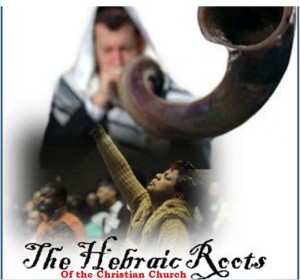Hebraic Root of the Christian Church
 The premise of the Hebraic Roots of the Christian Church seeks to restore the everlasting Hebraic concepts originally established by God, in the Bible. These Hebraic concepts were practiced by the early Christian Church. Subsequently, these biblical doctrines were abandoned by modern Christian believers and other principles were substituted in their place and portrayed as original truth. Having veered from the original doctrines of the early church, leaders, believers were indoctrinated by a new culture and belief that corresponded to the Greco=Roman philosophy, which ultimately replaced the original Hebraic concepts. Historically, the early Christians kept the Sabbath, that is, until the conversion of Emperor Constantine of Roman who enacted the first civil law mandating Sunday worship and forcing Sabbath keepers to worship underground. Emperor Constantine was a sun worshipper
The premise of the Hebraic Roots of the Christian Church seeks to restore the everlasting Hebraic concepts originally established by God, in the Bible. These Hebraic concepts were practiced by the early Christian Church. Subsequently, these biblical doctrines were abandoned by modern Christian believers and other principles were substituted in their place and portrayed as original truth. Having veered from the original doctrines of the early church, leaders, believers were indoctrinated by a new culture and belief that corresponded to the Greco=Roman philosophy, which ultimately replaced the original Hebraic concepts. Historically, the early Christians kept the Sabbath, that is, until the conversion of Emperor Constantine of Roman who enacted the first civil law mandating Sunday worship and forcing Sabbath keepers to worship underground. Emperor Constantine was a sun worshipper
Under the administration of Emperor Constantine and others, this new culture abandoned the formerly Hebraic principles and adopted principles closely connected with paganism. The subsequent actions of Emperor Constantine suggested that his conversion was more of a political nature than a genuine change of heart.
On the venerable day of the sun (Sunday, the first day of the week) let the magistrate and people residing in cities rest, and let all workshops be closed. In the country, however, persons engaged in agricultural work may freely and lawfully continue their pursuits; because it often happens that another day is not so suitable for grain growing or for vine planting; lest by neglecting the proper moment for such operations the bounty of heaven should be lost. – Schoff’s History of the Christian Church, vol. III, chap. 75.
Prior to this time, all the followers of Christ (Christians and true Jews alike) observed the Sabbath day on the seventh day of the week
The doctrine outlined in the Old and New Testaments confirm that Christ’s death, on the cross, was not a signal of an end to the Law of  Moses, for Christ assures us that until heaven and earth would pass, not one jot or one tittle would pass from the Law; furthermore, Christ came to fulfill (do) those things spoken of him in the law. Contrary to popular belief, Christ renewed the belief in the Law of Moses (Matthew 24:44-45). Therefore, a clear and concise understanding of the law is not possible without the benefit of the original Hebraic writings of the Old Testament.
Moses, for Christ assures us that until heaven and earth would pass, not one jot or one tittle would pass from the Law; furthermore, Christ came to fulfill (do) those things spoken of him in the law. Contrary to popular belief, Christ renewed the belief in the Law of Moses (Matthew 24:44-45). Therefore, a clear and concise understanding of the law is not possible without the benefit of the original Hebraic writings of the Old Testament.
It is, therefore, necessary to comb through the Holy Scriptures in order to discover the original Hebraic principles set forth by God, in the Bible, for identifying the old path (Job 12:12; Isaiah 58:12).
While it is not necessary to learn the entire Hebrew language in order to be saved, the Bible does reveal that God is so determined to turn His people unto a pure language so that they will all be able to serve Him with one consent (Zephaniah 3: 8- 9), that he will eventually destroy all nations that fail to adopt that pure language.

